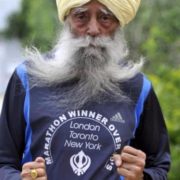The Mature Runner – Does the mature runner have a future?
By David Summerfield
Realistically, what DOES a mature runner have to look forward to? That’s a subject I’ve been avoiding for many decades. I keep reading about those runners who are much more my senior (in their 80’s, 90’s, and 100’s) who keep doing amazing things. It’s encouraging, but also daunting. How the heck will I ever be able to do those things 20-30 years from now, since I can’t even do them now?
In writing this September 2021 newsletter article, I really didn’t have a whole lot of inspiration to keep training to be a good “Mature Runner”. Every breakthrough “run” has always been followed by long periods of recovery, which is discouraging. Is this what I’m looking forward to every day from now on? Then I remembered this amazing Indian runner named Fauja Singh. This article should settle all doubts about what lies ahead – a life of constant inspiration for others, as Fauja has done for me. Read on in his own words:
“I was born in a village in Punjab in India in 1911. My memories are of a simple life without the stresses that people all over the world seem to have nowadays. I came from a farming family, and we learned to live within our means after working hard and honestly. We remembered God and were thankful to him. We shared with others less fortunate than ourselves. This is in keeping with the three tenets of my Sikh religion. I had a happy childhood and I was nurtured because I was weak. I couldn’t walk until l was five. I wanted to be sporty, but until then, I lacked the strength. But I enjoyed watching all the simple sporting activities that were prevalent in the rural environment at the time. And I remember the joy all around me when I became strong enough to be able to walk.
My last race was the Hong Kong 10km in 2013 when I was 101
As I never went to school, I farmed all of my working life. It was always handy to be able to run after straying cattle, but that was about as exciting as it got.
I didn’t really run competitively until I arrived in England 20 years ago.
Since then I have been looked after by one of my two remaining sons – this is the Asian culture where the parents are looked after by their children. I don’t speak English and not being able to communicate with those whom you meet does pose problems, but a smile always helps. I am usually accompanied, but over time I have become familiar with the routes and places I visit regularly. It must be equally frustrating for those who want to communicate with me. One thing is for sure: shouting or saying things slowly does not make it easier – this is what I observed from tourists visiting other countries! Being illiterate and monolingual does have its advantages – I am not aware of any abuse that may be directed at me. Anyone who is different sadly suffers this in the modern world.
When I attempted to run a marathon for the first time at 89, the reactions were mixed. Some were excited to see if I could do it and wished me well, others doubted I could do it. Those who have been constant in supporting me were my coach, Harmander; my running club, Sikhs in the City; and my family.
Training was easy: I just followed the instructions of my coach without question. If it was a training run, he never let me be exhausted as he said it is good to train but not so good to strain. When it came to the race, I was simply awestruck by the support from the crowds along the route. My coach always ran alongside me and held me back from exerting myself too much in the early stages of the race. He then encouraged me to keep going later on in the race, when the going got tough. I also then started talking to God to help me get through to the finish.
I don’t think I ran competitively in the true sense – it was simply a case of me finishing a distance as fast as I could. My records seem to be simply a by-product of my age. Records are meant to be broken and I wish the person who breaks my records all the best. If running a marathon at my age has inspired others to not give up then I am pleased to have had a positive impact on society. My last race was the Hong Kong 10km in 2013 when I was 101. Currently, I am not able to run as I have a hernia, but I remember fondly the feeling of freedom when I used to run not so long ago. I am just pleased that I am still mobile and independent. I still walk about five miles each day. Freedom for me is being independently mobile, and retaining a sound mind and a positive outlook. The rest is up to God.”
Fauja Singh has been awarded the British Empire Medal. He is thought to be the oldest person to complete a marathon, but as India did not issue birth certificates in 1911, the record is deemed unofficial. This interview was translated by Harmander Singh.
And here is more information and statistics Mature Runners thrive on:
“Fauja Singh was born in Beas Pind, Jalandhar, Punjab, British India on 1 April 1911, the youngest of four children. Singh did not walk until he was five years old. His legs were thin and weak, and he could hardly walk long distances. Because of this, he was often teased, and he was called by the nickname “danda” (Punjabi: ਡੰ ਡਾ for “stick”) for the next ten years. As a young man, Singh was an avid amateur runner, but he gave it up at the time of the Partition of India.
It was only after witnessing the death of his fifth son, Kuldip, in a construction accident in August 1994, that Singh returned to his passion for running, in 1995. The death of his wife in 1992, and his eldest daughter who had died from complications after giving birth to his third granddaughter, gave him the determination for this new focus in life. He emigrated to England in the 1990s and lives with one of his sons in Ilford.
At 89 years, he took seriously to running and ended up in international marathon events. When he first turned up for training at Redbridge, Essex, he was dressed in a three-piece suit. The coach had to rework everything, including his attire. Singh ran his first race, the London Marathon, in 2000. According to his coach, he used to run up to 20 kilometers easily and wanted to run a marathon, thinking it to be just 26 kilometers and not 26 miles (42 kilometers). It was after he realized this that he began training seriously.
At the age of 93, Singh completed a marathon in 6 hours and 54 minutes. This knocked 58 minutes off the previous world best for anyone in the 90-plus age bracket. In 2004, he was featured in an advertising campaign for sportswear manufacturer Adidas alongside David Beckham and Muhammad Ali. Singh holds UK records for the 200 m, 400 m, 800 m, mile and 3000 m for his age group, records all set within a single 94-minute period.
At the age of 100, Singh attempted and accomplished eight world age group records in one day, at the special Ontario Masters Association Fauja Singh Invitational Meet, held at Birchmount Stadium in Toronto, Ontario, Canada. Timed by officials in Canada, he ran the 100 meters in 23.14, 200 meters in 52.23, the 400 meters in 2:13.48, the 800 meters in 5:32.18, the 1500 meters in 11:27.81, the mile in 11:53.45, the 3000 meters in 24:52.47, and the 5000 meters in 49:57.39, setting five world records for his age group in one day. Some events had no previous record holder, as nobody over age 100 had ever attempted the distance. Some of his marks are significantly superior to the listed world record in the M95 age group as well.
Three days later, on 16 October 2011, Singh became the first 100-year-old to finish a marathon, completing the Toronto Waterfront Marathon in 8:11:06. As it took him over 14 minutes after the gun to cross the starting line, the official time submitted for the age group record will be 8:25:17.
However, Guinness World Records refused to include Singh in its record book because he could not produce his birth certificate to prove his age. Birth records were not kept in India in 1911. He was however able to produce a passport listing his date of birth as 1 April 1911, and a letter from Queen Elizabeth II congratulating him on his 100th birthday.
In October 2011, Singh, a vegetarian, became the oldest man to be featured in a PETA campaign. In July 2012, Singh carried the Olympic torch. Singh had stated that he would retire from competitive running after taking part in the Hong Kong marathon on 24 February 2013, five weeks shy of his 102nd birthday. He completed the 10 kilometre run at the Hong Kong marathon in 1 hour 32 minutes and 28 seconds, and said that he intends to continue running for pleasure, health and charity.
Singh was awarded the British Empire Medal in the 2015 New Year Honours for services to sport and charity. Singh is 1.72 m (5 ft 8 in) tall and weighs 52 kg (115 lb). He attributes his physical fitness and longevity to abstaining from smoking and alcohol and to following a simple vegetarian diet. He has been quoted as saying “I am very careful about different foods. My diet is simple phulka, dal, green vegetables, yogurt and milk. I do not touch parathas, pakoras, rice or any other fried food. I take lots of water and tea with ginger. … I go to bed early taking the name of my Rabba (God) as I don’t want all those negative thoughts crossing my mind.”
Speaking about the marathon, he said: “The first 20 miles are not difficult. As for last six miles, I run while talking to God.”
Running Career
● Marathons run: London (6), Toronto (2), New York (1)
● Marathon debut: London, 2000, aged 89
● London Flora Marathon 2000: 6:54
● London Flora Marathon 2001: 6:54
● London Flora Marathon 2002: 6:45
● Bupa Great North Run (Half Marathon) 2002: 2:39
● London Flora Marathon 2003: 6:02
● Toronto Waterfront Marathon 2003: 5:40
● New York City Marathon 2003: 7:35
● London Flora Marathon 2004: 6:07
● Glasgow City Half Marathon 2004: 2:33
● Capital Radio Help a London Child 10,000 m 2004: 1:08
● Toronto Waterfront Half Marathon 2004: 2:29:59
● Toronto Waterfront Marathon 2011: 8:11:0
● London Marathon 2012 : 7:49:21
● Hong Kong Marathon (10 km) 2012: 1:34 (raised $25,800 for charity)
● parkrun uk 2012 – Age graded record holder: 179.04% with a time of 38:33
● Hong Kong Marathon (10 km) 2013: 1:32:28



